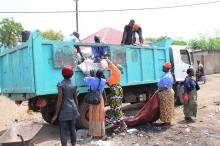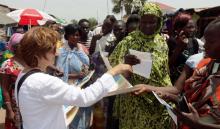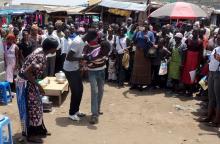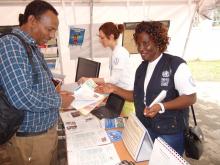South Sudan marks World Health Day 2015 under the theme: From farm to plate, make food safe
South Sudan on 7 April 2015 joined the rest of the world to mark World Health Day under the theme: 'From farm to plate, make food safe'.
To celebrate the day and translate this year’s theme to the local context, WHO in collaboration with Ministry of Health (MOH) and partners conducted various activities. These included the launch of the African Region Health Report 2014; the donation of 10 ambulances, two vehicles, 288 bicycles and three motorcycles to the MOH; an exhibition on food safety and a public awareness campaign at selected markets in Juba.
Addressing guests at the commemoration, various speakers emphasized the urgent need for government organizations, food businesses and consumers to put measures in place that will improve food safety from the point of production to consumption. Unsafe food is linked to an estimated 2 million annual deaths globally, including in Africa. Infants, young children, pregnant women, the elderly and those with an underlying illness are particularly vulnerable.
"For example, in 2014, there were more than 100 000 cases of cholera in 22 countries resulting in over 1700 deaths. So far this year, cholera outbreaks in 13 countries have led to over 200 deaths out of more than 13 000 cases," said Dr Tarande Manzila, WHO Representative to South Sudan.
This was underscored by the State Minister of Health (SMOH) for Central Equatoria State Honourable Felix Lado, who spoke on behalf of the National Minister of Health, Dr Riek Gai Kok. He noted that the focus on food safety is particularly important to South Sudan, which experienced a cholera outbreak in 2014 in which 6421 cases and 167 deaths were reported.
"Unsafe food was the source of infection in the 2014 cholera outbreak in South Sudan, as the index case [the first case] was traced to a meal the person ate from a food vending station at one of the markets in Juba," he said.
WHO is working to ensure access to adequate, safe, nutritious food for everyone. The Organization supports countries to prevent, detect and respond to foodborne disease outbreaks—in line with the Codex Alimentarius, a collection of international food standards, guidelines and codes of practice covering all the main foods.
Food safety is a cross-cutting issue and a shared responsibility that requires participation of non-public health sectors (i.e. agriculture, trade and commerce, environment, tourism) and support of major international and regional agencies and organizations active in the fields of food, emergency aid and education.
On its part, the Republic of South Sudan has embarked on various initiatives that promote food safety from a public health perspective. These include the adoption of the second National Health Policy in January 2015, the Public Health bill currently being developed, strengthening the Integrated Disease Surveillance and Response capacity from national to lower sub-national levels and the establishment of guidelines for regulating food handlers at state level.
Launch of the African Region Health Report 2014
This report uses a wide range of data to show that the overall health of the people living in the Region has improved considerably in the past decade. Some of this has been due to demographic and economic change and to improved political stability. But much has also been due to sustained efforts to prevent illness and maintain good health, improve access to treatment when illness does occur, and find ways to deliver a better level of health care in the African context.
Achieving health is all about understanding context: applying the right approach in the right place at the right time for the right problem in the right people. By showing what works, this report reveals the shifting paradigm from reactive, disease alleviation strategies to proactive health and development promotion approaches. Common to all these changes is the underpinning idea that health is an outcome of all policies.
Donation of ambulances and vehicles.
In line with WHO’s commitment to support the response to the humanitarian situation in South Sudan by strengthening health systems through technical and material support, the organisation donated 10 ambulances, two vehicles, 288 bicycles and three motorcycles to the Ministry of Health.
It is hoped that the ambulances will help to reduce the delay by pregnant women to access emergency obstetric care and thereby contribute to reducing neonatal and maternal mortality. The vehicles, motorcycles and bicycles will help with the surveillance of guinea worm disease and onchocerciasis, thereby contributing towards the elimination of both diseases in South Sudan.
Food Safety Exhibition
In efforts to promote various aspects of food safety – from farm to plate – MOH, WHO, UNICEF, WFP and FAO hosted an exhibition on various aspects of food safety. Information was disseminated through various means, including video and printed materials.
Public Awareness Campaign
Building on the momentum from World Health Day, WHO supported the Ministry of Health to hold a public awareness campaign on food safety at Libya and Malishia markets, in Munuki payam, Juba County, Central Equatoria State on 8 April. Activities included a clean-up exercise, food inspection, a drama and the distribution of information, education and communication (IEC) materials on food safety at the market.
The events, coupled with continued media coverage, raised awareness and contributed to public discussions on food safety.
_________________________________________
Matilda Moyo, Communications Consultant
WHO Surge Team
Juba, South Sudan
Mobile: +211 955 036 439
Email: matilda.moyo [at] gmail.com (matilda[dot]moyo[at]gmail[dot]com)
Skype: matilda.moyo
_________________________________________
01. Juba Council employees clean up the city during the public awareness campaign
02. Local authority employees and community members participated in the clean up campaign by collecting rubbish and putting it in the trucks
03. A WHO employee distributes information on food safety during the public awareness campaign
04. Vendors at the market temporarily stopped work to watch the skit on food safety
05. WHO employees share information with visitors during the food safety exhibition
Photo credits: Matilda Moyo, .D.Lunn, M. Gagar









